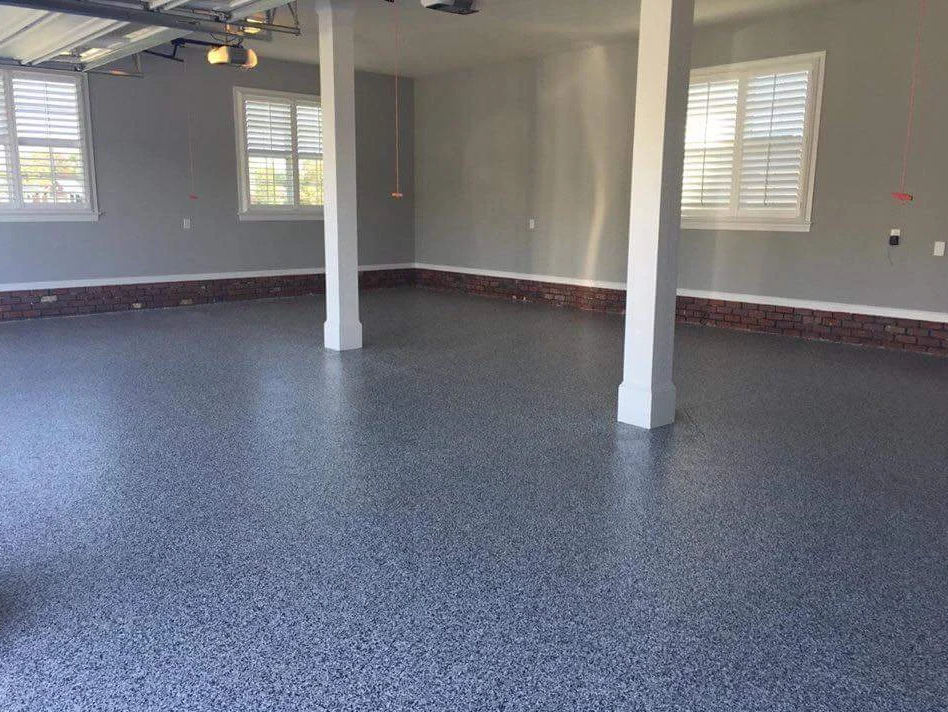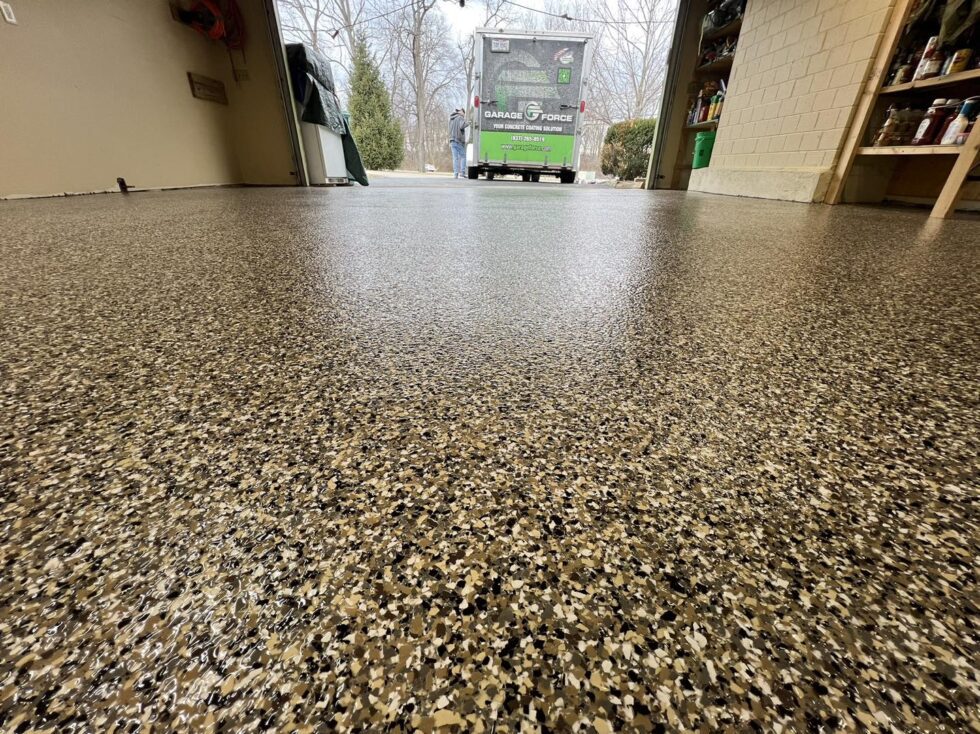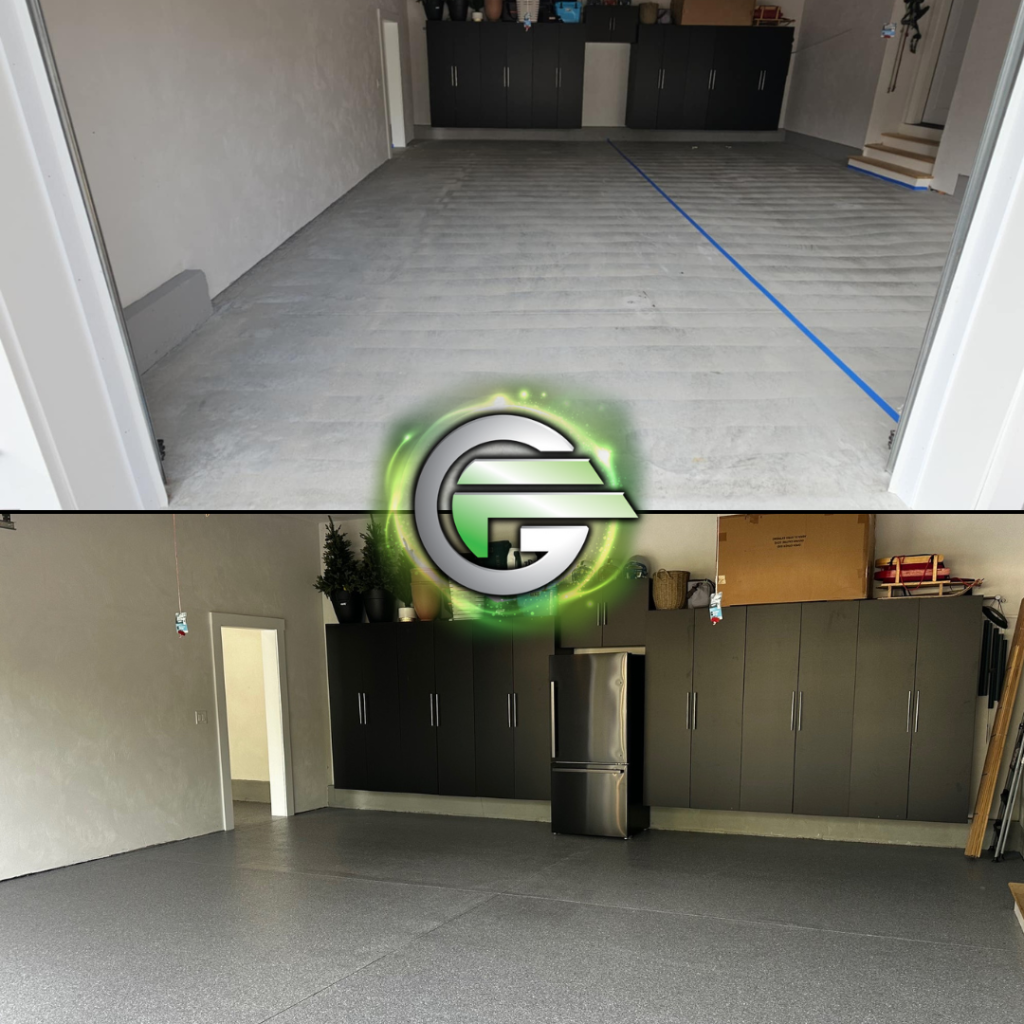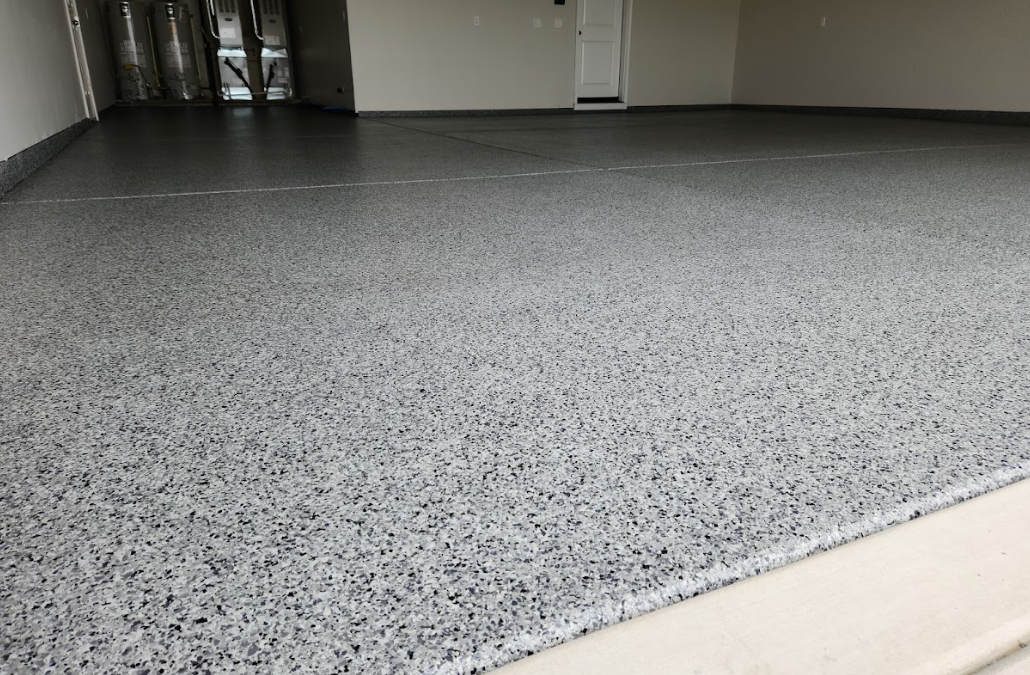Are you tired of your dull, stained garage floor? Want to give your garage a fresh, clean look that lasts? A garage epoxy floor might be the perfect solution. This comprehensive guide will explore everything you need to know about garage floor epoxy coatings, from their benefits to installation tips.
What Are Epoxy Floor Coatings?
Epoxy floor coatings are a type of floor finish made from epoxy resins and hardeners. When mixed, these components create a strong, durable garage floor coating that bonds well to concrete surfaces.
High-quality epoxy coatings are popular for garage floors due to their strength, durability, and attractive appearance.

Benefits of Epoxy Flooring for Garages
Garage floor coatings, including epoxy floors, offer numerous advantages:
- Durability: Epoxy coatings create a tough surface that resists wear, impacts, and chemical spills.
- Easy to Clean: The smooth surface of epoxy floors makes them simple to sweep and mop.
- Attractive Finish: Epoxy coatings come in various colors and can include decorative flakes for a custom look.
- Increased Safety: Many epoxy coatings offer slip-resistant properties.
- Moisture Resistance: Epoxy floors help protect the concrete beneath from moisture damage.
- Chemical Resistance: Epoxy coatings resist stains from oil, gasoline, and other vehicle fluids.
Types of Epoxy Floor Coatings
There are several types of garage floor finishes and epoxy floor coatings to choose from:
Water-Based Epoxy: Water-based epoxy is easier to apply and has less odor, making it a good choice for DIY projects. However, it may not be as durable as other types.
Solvent-Based Epoxy: This type of epoxy penetrates concrete better, creating a stronger bond. It’s more durable than water-based epoxy but has a stronger odor during application.
Solid Epoxy: Solid epoxy contains 100% epoxy and no solvents. It’s the most durable option but can be challenging to apply.
Self-Leveling Epoxy: This type of epoxy is ideal for uneven floors as it spreads to create a level surface.
Preparing Your Garage Floor for Epoxy Coating
Proper preparation is crucial for a successful garage flooring epoxy installation. Before you begin coating, follow these steps:
- Clean the Floor: Remove all dirt, dust, and grease from the concrete surface.
- Repair Cracks: Fill any cracks or holes in the concrete before applying epoxy.
- Test for Moisture: Excessive moisture can prevent epoxy from bonding properly. Conduct a moisture test before installation.
- Etch or Grind the Surface: Use mechanical abrasion or acid etching to create a profile for the epoxy to adhere to.

Steps to Install Epoxy Flooring
Here’s a basic overview of the epoxy flooring installation process:
- Apply Primer: A primer coat helps the epoxy bond better to the concrete.
- Mix the Epoxy: Combine the epoxy resin and hardener according to the manufacturer’s instructions.
- Apply the Base Coat: Use a roller frame and roller covers to spread the epoxy evenly across the floor.
- Add Color Chips: If desired, broadcast decorative flakes onto the wet epoxy for added visual appeal.
- Apply Clear Coat: Once the base coat is dry, apply a clear topcoat for extra protection and shine
Common Mistakes to Avoid When Installing Epoxy Coating
When it comes to installing epoxy coating on your garage floor, there are several common mistakes that can lead to a subpar finish, reduced durability, and even safety hazards. Here are some of the most frequent pitfalls to watch out for:
- Insufficient Surface Preparation: One of the most critical steps in applying an epoxy coating is preparing the surface. Failing to properly clean and prepare the concrete can result in a weak bond between the epoxy and the floor, leading to peeling and flaking over time. Make sure to remove all dirt, dust, and grease, and repair any cracks or holes before you begin.
- Inadequate Mixing: Properly mixing the epoxy resin and hardener is essential for achieving a smooth, even finish. If the components are not mixed thoroughly, you may end up with a finish that is uneven, discolored, or lacks the desired texture. Follow the manufacturer’s instructions carefully to ensure a consistent mix.
- Incorrect Application Temperature: Temperature plays a significant role in the curing process of epoxy coatings. Applying the epoxy in extreme temperatures—either too hot or too cold—can affect its curing, resulting in a finish that is brittle, soft, or discolored. Aim to apply the epoxy in a controlled environment with temperatures between 60°F and 90°F.
- Insufficient Drying Time: Patience is key when applying epoxy coatings. Failing to allow the epoxy to dry completely between coats can lead to a tacky, sticky finish that is prone to peeling. Make sure to follow the recommended drying times between each coat to ensure a strong, durable bond.
- Over-application: Applying too much epoxy can lead to a thick, uneven finish that is prone to cracking. It’s better to apply multiple thin coats rather than one thick coat. This approach ensures a smoother, more even finish and reduces the risk of imperfections.
By avoiding these common mistakes, you can ensure a successful epoxy coating installation that provides a durable, long-lasting finish for your garage floor.
DIY vs. Professional Installation: Which is Right for You?
When it comes to installing an epoxy coating on your garage floor, you have two main options: DIY or professional installation. Both approaches have their own set of advantages and disadvantages. Here’s a closer look to help you decide which is right for you:
Curing and Drying Times
Epoxy coatings typically take between 2-7 days to fully cure, depending on the specific product and environmental conditions. While your garage floor might be dry to the touch within a day, it’s essential to wait the full curing period before subjecting it to heavy traffic or placing heavy objects on it
Maintaining Your Epoxy Garage Floor
To keep your epoxy floor looking great:
- Sweep regularly to remove dirt and dust.
- Clean spills promptly to prevent staining.
- Use a soft mop and mild cleaner for routine cleaning.
- Avoid dragging heavy objects across the floor.
Tips for a Successful Garage Floor Transformation
Transforming your garage floor with an epoxy coating can be a rewarding project, but it requires careful planning and execution. Here are some tips to ensure a successful garage floor transformation:
- Plan Ahead: Before starting the project, make sure you have all the necessary materials, tools, and equipment. This includes the epoxy resin and hardener, primer, rollers, brushes, and protective gear.
- Prepare the Surface: Properly cleaning and preparing the surface is crucial for a strong bond between the epoxy and the concrete. Remove all dirt, dust, and grease, and repair any cracks or holes. Etch or grind the surface to create a profile for the epoxy to adhere to.
- Choose the Right Epoxy: Select a high-quality epoxy that is suitable for your garage floor and climate. Consider factors such as durability, chemical resistance, and ease of application.
- Follow Instructions: Carefully follow the manufacturer’s instructions for mixing, applying, and drying the epoxy. This ensures a consistent and durable finish.
- Work in a Well-Ventilated Area: Make sure the area is well-ventilated to prevent inhaling fumes and to ensure proper curing. Use fans or open windows to improve airflow.
- Apply Thin Coats: Apply thin coats of epoxy to avoid pooling and unevenness. Multiple thin coats provide a smoother, more even finish and reduce the risk of imperfections.
- Allow Proper Drying Time: Allow the epoxy to dry completely between coats to ensure a strong bond and a durable finish. Rushing the process can lead to a tacky, sticky surface that is prone to peeling.
By following these tips, you can ensure a successful garage floor transformation that provides a durable, long-lasting finish for your epoxy coating project.

Cost Considerations
The cost of epoxy flooring varies based on several factors, including the size of your garage, type of epoxy used, and whether you choose DIY or professional installation. On average, expect to pay between $3 to $12 per square foot for professional installation.
Conclusion: Is Epoxy Flooring Right for Your Garage?
Epoxy floor coatings offer a durable, attractive, and low-maintenance solution for garage floors. While the initial investment may be higher than simple paint, the long-term benefits often outweigh the cost. Whether you choose a DIY approach or professional installation, epoxy flooring can transform your garage into a clean, functional space you’ll be proud to show off.
Even better. Garage Force’s Cyclospartic™ coatings are a step above traditional polyurea or epoxy floors. With increased durability, strength, and adhesion, consider making the investment in your space by getting in touch with your local Garage Force today.

